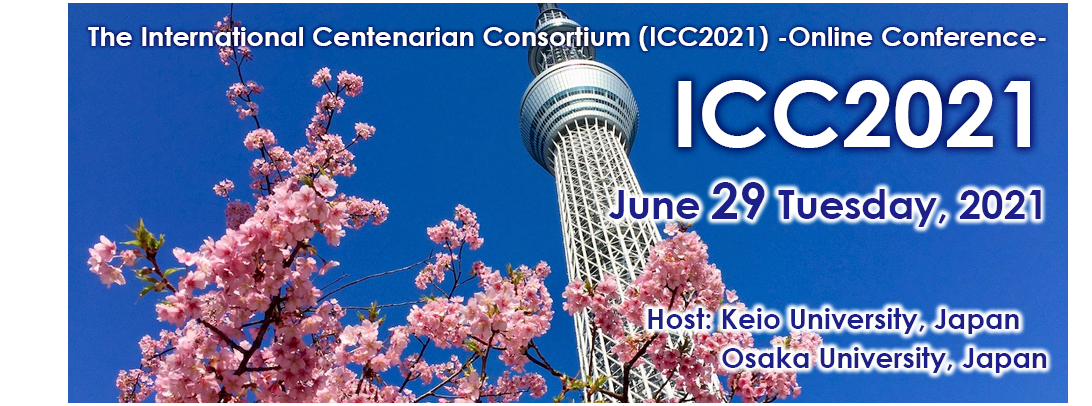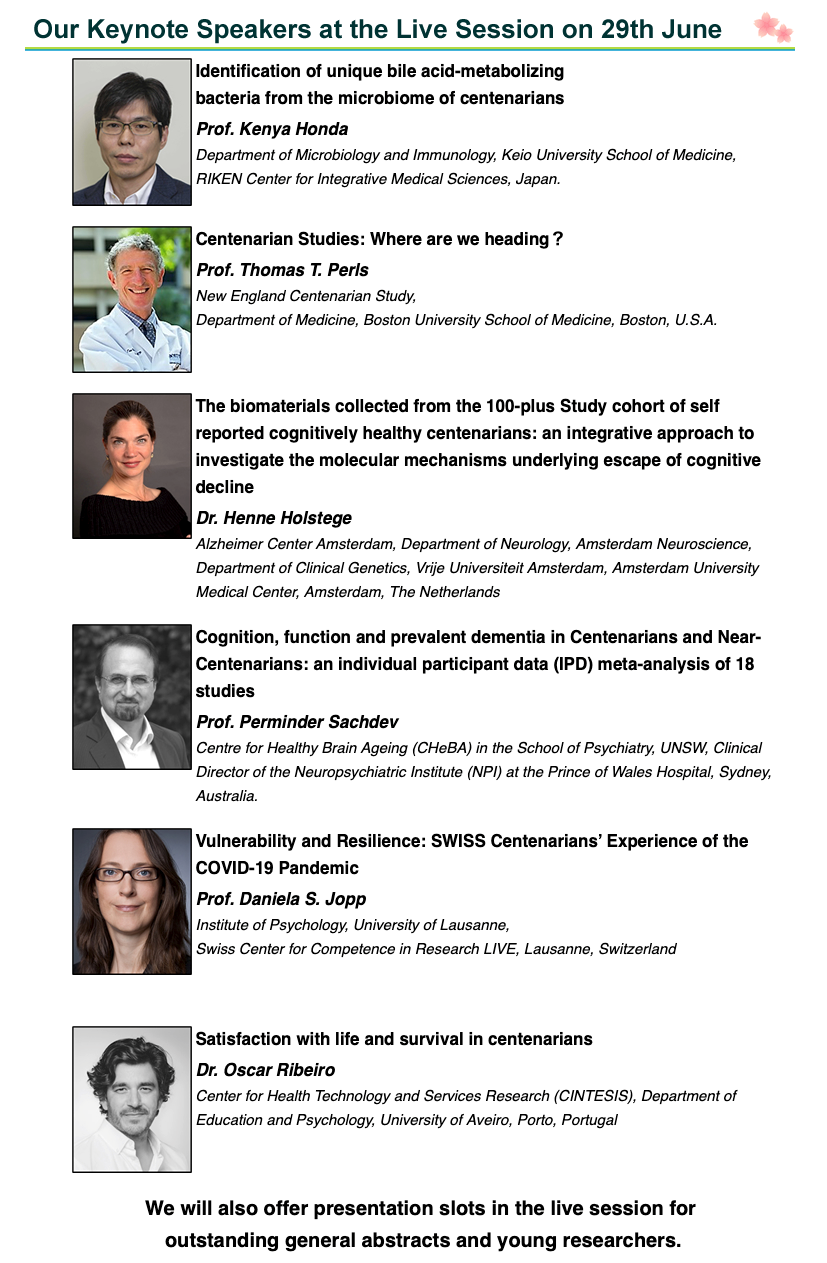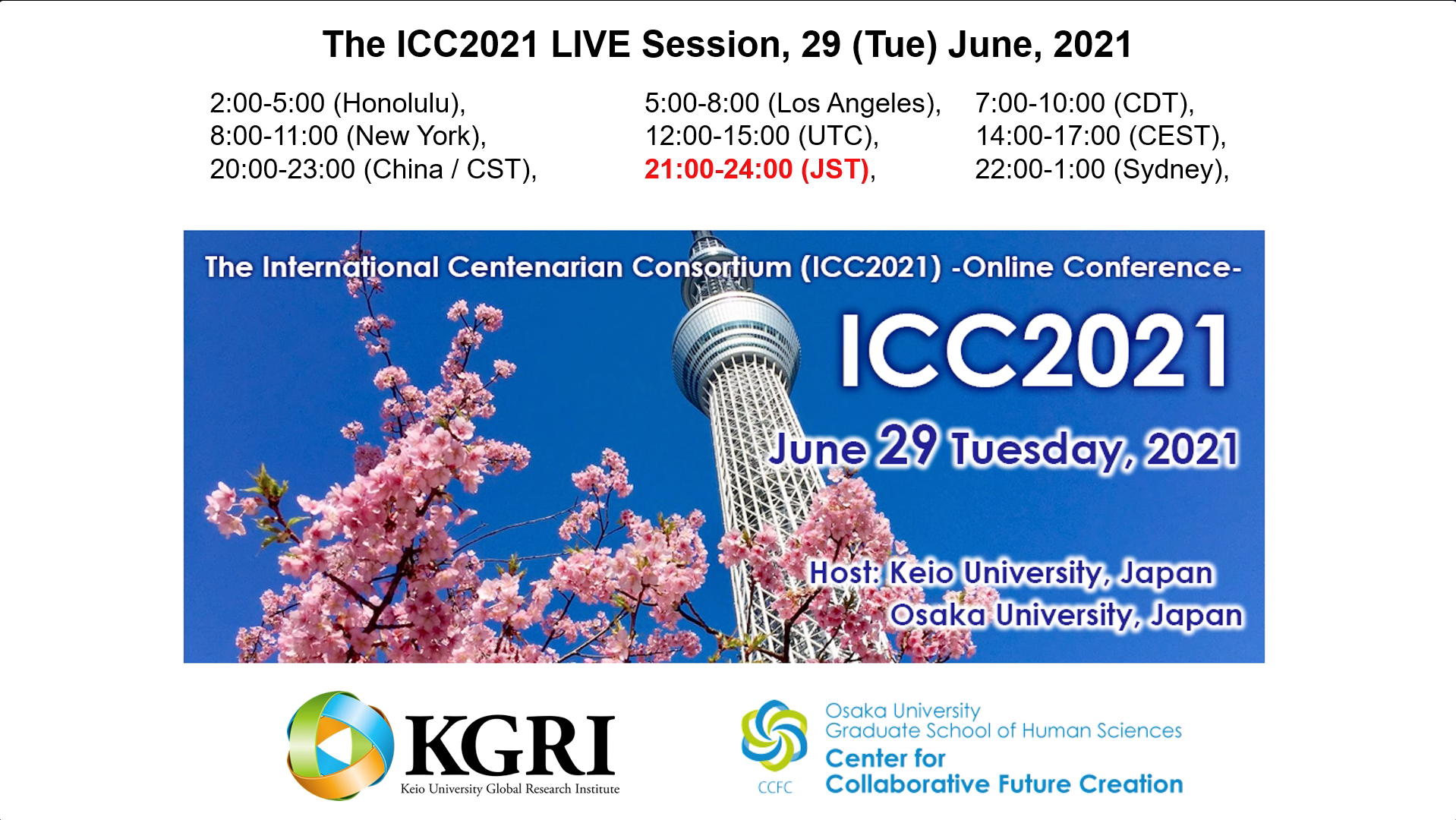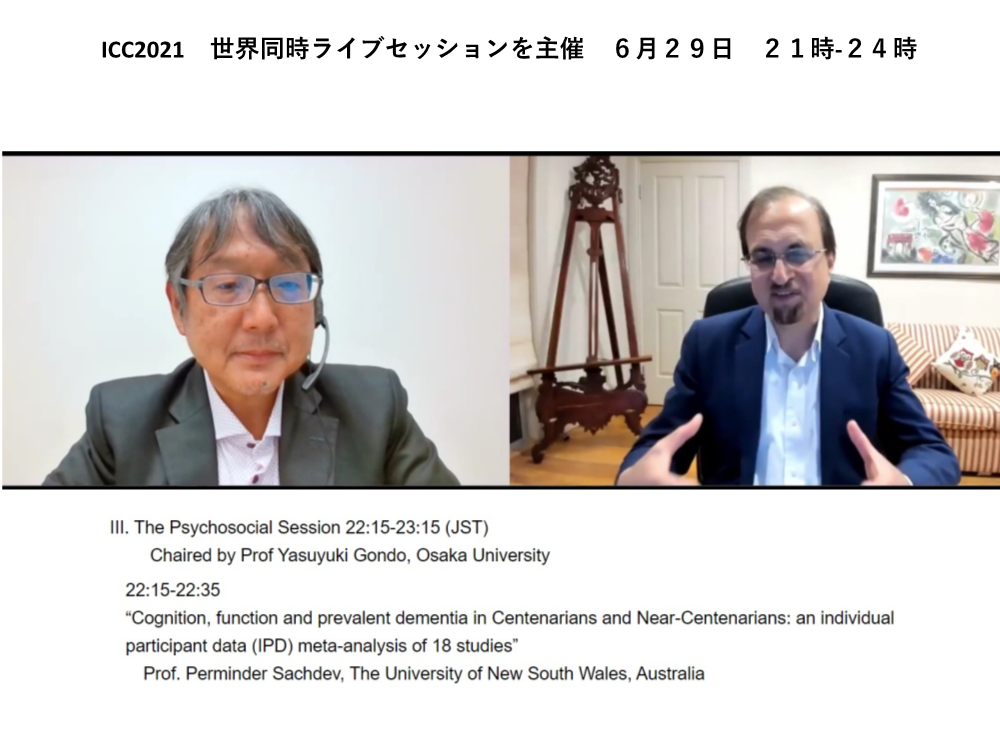[Event report] International Centenarian Consortium 2021 online conference (held on June 29, 2021)
2021.08.16The International Centenarian Consortium (ICC) meeting, which has been held since 1989, was originally scheduled to take place in Japan in June 2020; however, it was postponed for one year due to the COVID-19 pandemic and jointly held online from June 22 to July 3, 2021, by the Center for Supercentenarian Medical Research at the Keio University School of Medicine and the Osaka University Graduate School of Human Sciences. During this period, the ICC2021 Online Conference was also held on Tuesday, June 29 from 9:00 p.m. to 12:00 a.m. Japan Standard Time, with approximately 80 researchers in the fields of longevity and centenarians participating from around the world.
Proceedings began with the opening remarks of Guest Professor Nobuyoshi Hirose from Keio University and ICC leader Professor Peter Martin from Iowa State University, during which they explained the circumstances leading up to the event being held as an online conference as a result of the coronavirus pandemic, as well as touching on topics such as the history of the ICC.
Next, the three distinguished researchers below each gave a keynote lecture during the Biomedical Session chaired by Professor Yasumichi Arai of Keio University.
- Professor Kenya Honda (Keio University)
In his lecture titled "Identification of unique bile acid-metabolizing bacteria from the microbiome of centenarians," Professor Honda discussed the antibacterial activity against malignant intestinal bacteria of certain bile acids that are characteristically seen to increase in the intestines of centenarians and which are anticipated to have a relationship to longevity. - Professor Thomas Perls (Boston University, USA)
In his lecture titled "Centenarian Studies: Where are we heading?" Professor Perls spoke about the orientation of future centenarian research and gave an overview of recent longevity and centenarian studies from a variety of angles. - Dr. Henne Holstege (Amsterdam University Medical Center, Netherlands)
In her lecture titled "The biomaterials collected from the 100-plus Study cohort of self-reported cognitively healthy centenarians: an integrative approach to investigate the molecular mechanisms underlying escape of cognitive decline," Dr. Holstege explained about research on centenarians in the Netherlands, in particular studies that have combined research on cognitive functions and brain tissue.
Next, the three prominent researchers below each gave a keynote lecture during the Psychosocial Session chaired by Professor Yasuyuki Gondo of Osaka University.
- Professor Perminder Sachdev (University of New South Wales, Australia)
In his lecture titled "Cognition, function and prevalent dementia in Centenarians and Near-Centenarians: an individual participant data (IPD) meta-analysis of 18 studies," Professor Sachdev spoke about various research concerning the cognitive functions of centenarians, including the increasing risks that accompany aging and the higher risks that exist in women, as identified by a meta-analysis of 18 studies on centenarian cognitive functions overseen by him and his team. - Professor Daniela S. Jopp (University of Lausanne, Switzerland)
In her lecture titled "Vulnerability and Resilience: SWISS Centenarians' Experience of the COVID-19 Pandemic," Professor Jopp talked about the results of a telephone survey of 40 centenarians and their families as part of the SWISS100 study undertaken by her and her research group. - Dr. Oscar Ribeiro (University of Aveiro, Portugal)
In his lecture titled "Satisfaction with life and survival in centenarians," Dr. Ribeiro discussed the satisfaction levels of 83 centenarians in two Portuguese longitudinal studies under his jurisdiction.
Next, a Presentation Award Session chaired by Professor Yasumichi Arai of Keio University took place, during which Professor Kwangsung Park from Chonnam National University, South Korea, a new participant in the conference, and the student award recipients Dr. Giulia Accardi from the University of Palermo, Italy; Dr. Niccola Tesi from Amsterdam UMC, Netherlands; and Dr. Rotem Arieli from Iowa State University, United States, each gave a 10-minute presentation followed by a lively Q&A.
In the final session, Professor Ingmar Skoog of the University of Gothenburg, Sweden, announced the details of the next ICC meeting, which will be held next year from May 25 to May 28 in Marstrand near Gothenburg, Sweden. Finally, Professor Yasuyuki Gondo wrapped up the conference with his closing remarks.
Despite taking place over a short period of three hours, the six lectures by the keynote speakers and four presentations during the Award Session, along with the many Q&A sessions, ensured that this time was densely packed. While the online format of the conference proved to be a very beneficial tool for allowing people from numerous regions, including Europe, America, Oceania, and Asia, to simultaneously participate in the proceedings and debate with one another, the desire of many to conduct a meeting face-to-face after the pandemic was equally apparent during the conference. We are sincerely grateful to the three conference hosts, the Keio University Global Research Institute (KGRI), the Center for Collaborative Future Creation Project Aging and Death Study Lab (CCFC) at the Osaka University Graduate School of Human Sciences, and the NOVARTIS Foundation (Japan) for the Promotion of Science, as well as to all the people who attended.









